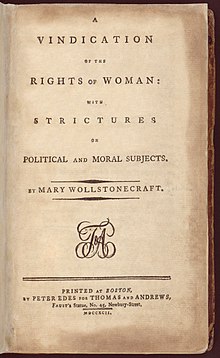User:TennesseeJesus/First-wave feminism copied from sandbox
First-wave feminism was a period of feminist activity and thought that occurred during the 19th and early 20th centuries throughout the Western world. It focused on legal issues, primarily on securing women's right to vote. The first wave of feminism occurred in the late nineteenth and early twentieth centuries, emerging from an environment of urban industrialism and liberal, socialist politics. The goal was to open up opportunities by focusing on suffrage. Feminism is often categorized as 'waves' - periods aimed at elevating women's status in society and giving them equal rights.
The term first-wave feminism itself was coined by journalist Martha Lear in a New York Times Magazine article in March 1968 entitled "The Second Feminist Wave: What do these women want?" First-wave feminism is characterized as focusing on the fight for women's political power instead of de facto unofficial inequalities. While the wave metaphor is well established in academic literature, it has been criticized for creating a narrow view of women's liberation that erases the lineage of activism and focuses on specific visible actors.
Main articles: History of feminism and Proto feminism. Astell and Aphra Behn together laid the groundwork for feminist theory in the 17th century.
Movements to broaden women's rights began much earlier than the 20th century. In her book The Second Sex, Simone de Beauvoir wrote that the first woman to "take up her pen in defense of her sex" was Christine de Pizan in the 15th century. Feminists Heinrich Cornelius Agrippa and Modesta di Pozzo di Forzi worked in the 16th century. Marie le Jars de Gournay, Anne Bradstreet , and François Poullain de la Barre's Equality of sexes came out in 1673.
Wollstonecraft[edit][edit]
Main article: Mary Wollstonecraft
The period in which Mary Wollstonecraft wrote was affected by Rousseau and the philosophy of the Enlightenment. The father of the Enlightenment defined an ideal democratic society that was based on the equality of men, where women were often discriminated against. The inherent exclusion of women from the discussion was addressed by both Wollstonecraft, and her contemporaries. Wollstonecraft based her work on the ideas of Rousseau. Although at first, it seems to be contradictory, Wollstonecraft's idea was to expand Rousseau's democratic society based on gender equality. Mary Wollstonecraft spoke boldly on the inclusion of women in the public lifestyle; more specifically, narrowing down on the importance of female education. She took the term 'liberal feminism' and devoted her time to breaking through the traditional gender roles.

Wollstonecraft published one of the first feminist treatises, A Vindication of the Rights of Woman (1792), in which she advocated the social and moral equality of the sexes, extending the work of her 1790 pamphlet, A Vindication of the Rights of Men. Her later unfinished novel, Maria, or the Wrongs of Woman, earned her considerable criticism as she discussed women's sexual desires. She died young, and her widower, the philosopher William Godwin, quickly wrote a memoir of her that, contrary to his intentions, destroyed her reputation for generations.
Wollstonecraft is regarded as the "foremother" of the British feminist movement and her ideas shaped the thinking of the suffragettes, who campaigned for the women's vote
Education[edit][edit]

Education amongst young Swiss women was very important during the suffrage movement. Educating young women in society was very important to the public and for women to realize their full potential. The Swiss suffrage movements believed it was important for young women to know that there was more to their life than just bearing children, which was a very universal thought and action during the suffrage movements in the 1960s and 70s. In 2015, an evaluation from Lord David Willetts discovered and stated that in 2013 the percentage of undergraduate students in the UK was 54 percent female, and 46 percent male undergraduates. Whereas, in the 1960s only 25 percent of full-time students in the United Kingdom were females. The increase of females attending school and contributing to the educational system can be linked to the women's suffrage movements that aimed to encourage women to enroll in school for higher education. This right and political affair came after the right for women to vote in political elections which was granted in 1971. In the 1960s, in the United Kingdom, women were usually the minority and a rarity when it came to the higher education system. When “The Feminine Mystique” was published in the United States by Betty Friedan in 1963, the feminist movements set a new standard and gender roles for women as well. Friedan argued that the feminine mystique hurt women both personally and professionally. The feminine mystique described the persuasive dissatisfaction among women in mainstream American society. Freidan coined the term feminine mystique to describe the societal assumption that women could find fulfillment through housework, marriage, child-rearing, and sexual passivity alone. Friedan noted that many housewives were unsatisfied with their lives but had difficulty articulating their feelings, and she used statistics and interviews to illustrate women's desire to achieve the feminine mystique. The feminine mystique was one of many catalysts for the second-wave feminist movement (Churchill, L. Blake, 2020, Feb 19).
By country[edit][edit]
Argentina[edit][edit]
During the last decade of the nineteenth century and the first of the twentieth century, women in Argentina organized and consolidated one of the most complex feminist movements in the western world. Closely associated with the labor movement, they were socialists, anarchists, libertarians, emancipations, educationists, and Catholics. In May 1910 they organized together the First International Feminist Congress. Well-known European, Latin, and North American workers, intellectuals, thinkers, and professionals like Marie Curie, Emilia Pardo Bazán, Ellen Key, Maria Montessori, and many others presented and discussed their ideas research work, and studies on themes of gender, political and civil right, divorce, economy, education, health, and culture.
References[edit]
Churchhill, L Blake (2020, February 19). The Feminine Mystique. Encyclopedia Britannica.
http://www.britannica.com/topic/The-Feminine-Mystique
Feminism: The First Wave (2021 April 5)
